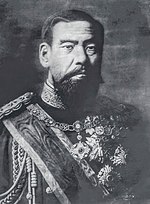Emperor Meiji, Date of Birth, Place of Birth, Date of Death
TweetEmperor Meiji
Emperor of Japan from 1867 until 1912About Emperor Meiji
- Emperor Meiji (????, Meiji-tenno, 3 November 1852 – 30 July 1912), or Meiji the Great (????, Meiji-taitei), was the 122nd Emperor of Japan according to the traditional order of succession, reigning from 3 February 1867 until his death on 30 July 1912.
- He presided over the Meiji period, a time of rapid change that witnessed the Empire of Japan rapidly transform from an isolationist feudal state to an industrialized world power. At the time of Emperor Meiji's birth in 1852, Japan was an isolated, pre-industrial, feudal country dominated by the Tokugawa shogunate and the daimyos, who ruled over the country's more than 250 decentralized domains.
- By the time of his death in 1912, Japan had undergone an extensive political, economic, and social revolution and emerged as one of the great powers on the world stage.
- The New York Times summed up this transformation at the Emperor's funeral in 1912 with the words: "the contrast between that which preceded the funeral car and that which followed it was striking indeed.
- Before it went old Japan; after it came new Japan."Since the modern era, when an Emperor of Japan dies they are given a posthumous name.
- Such a name is a combination of the era of which they reigned and coincides with the Emperor's contribution to the throne whilst they were alive.
- Therefore, while publicly known during his life merely as "The Emperor", he is historically known as "Emperor Meiji" after his death.
- He obtained this current title in reference to the Meiji period which spanned almost the entirety of his reign.
- His personal name (which is not used in any formal or official context, except for his signature) was Mutsuhito (??).
Read more at Wikipedia


 Date of Birth:
Date of Birth:  Place of Birth: Kyoto, Kyōto Prefecture, Japan
Place of Birth: Kyoto, Kyōto Prefecture, Japan